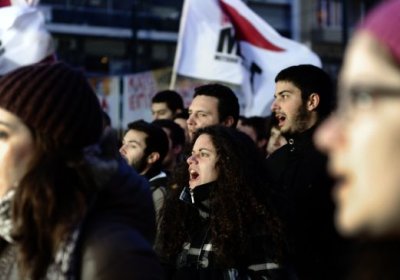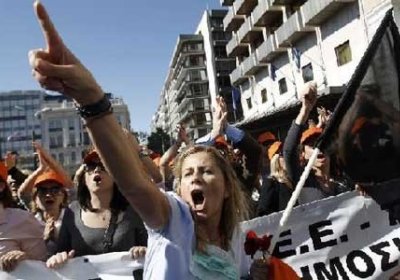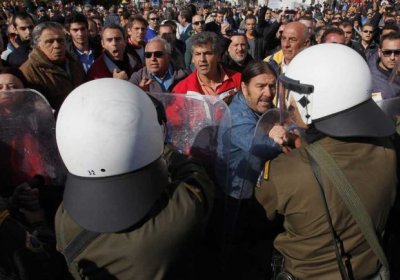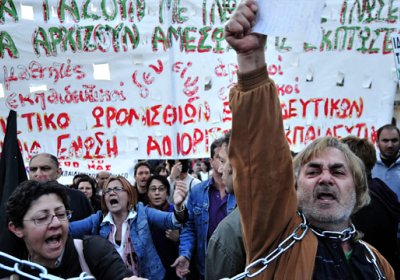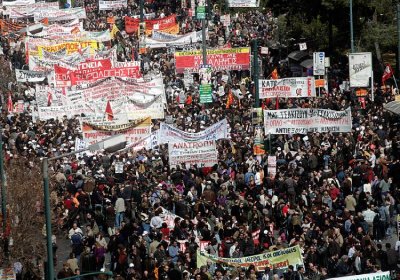Greek unions launched a two-day general strike on February 10 against new extreme austerity measures the “troika” of the International Monetary Fund, European Central Bank and European Union is seeking to impose on the southern European nation. The deal will give Greece a new “bail-out” worth 130 billion euros (A$161 billion) in return for fresh spending cuts.
Amid ongoing street protests and building occupations, the Greek cabinet approved the deal on February 10. Six cabinet members resigned in protest. Greek parliament was scheduled to vote on the deal on the evening of February 12.
Afrodity Giannakis
The savage austerity in Greece has affected people’s lives in many different ways. The hardship faced by Greek people has been directly reflected in their psychological condition.
“There is money.” That was the major election campaign slogan of the Panhellenic Socialist Movement (PASOK) in October 2009.
Over October 19-20 there was a general strike in Greece. The overwhelming majority of Greek workers took part in the strike with dynamic demonstrations and other forms of action. In that way, Greek people expressed their anger and despair over the devastating measures carried out in Greece in the past year and a half.
The relentless, vicious austerity measures have been imposed by the PASOK (Panhellenic Socialist Movement) government and the “troika” of the International Monetary Fund, the European Central Bank (ECB) and the European Union.
A victory was achieved by the anti-memorandum, anti-government movement on October 28. It was commemoration day of the resistance to the German occupation of Greece, which started in 1940.
A 50% cut of part of Greece’s debt was decided on by a summit of European leaders on October 26. The deal will entail long-term austerity measures being enforced on the Greek people.
The lead-up to the payment of the sixth installment of International Monetary Fund (IMF) loans to Greece, to be handed out in October, finds Greek people in a state of shock and helplessness.
The first “memorandum” agreement was signed by the Panhellenic Socialist Movement (PASOK) government with the IMF and European Union (EU) representatives in May 2010. It came after two decades of savage neoliberal attacks by successive New Democracy (the major right-wing party) and PASOK (so-called “socialist”) governments.
I wander
in a city
with hard
games
no fun and games
no laughing matter
(we don’t play we don’t laugh)
life
Russian roulette
inside
Russian dolls
boxes
within
boxes
within –
built-up
blocks of land
building complexes
buildings
blocks of flats
flats
rooms
where
scattered
other
boxes
food
shut
in metal
plastic
so efficient
vitamins
in boxes
spell
deficient
feasts
on screens
a distant
memory
now
tinned
sofa
merry-
making
sufficient.
I take
tablets
for stimulation
for sex
and recreation
in lovely colour pink
and others
for sedation
The Greek parliament defied huge popular opposition, including a 48-hour general strike, to pass the latest set of extreme austerity measures demanded by the “troika” (the European Union, the European Central Bank and the International Monetary Fund) in return for fresh loans.
However, many commentators have pointed out it is one thing to vote up the measures and another to force them on an increasingly discontented populace.
The Greek parliament defied huge popular opposition, including a 48-hour general strike, to pass the latest set of extreme austerity measures demanded by the “troika” (the European Union, the European Central Bank and the International Monetary Fund) in return for fresh loans.
However, many commentators have pointed out it is one thing to vote up the measures and another to force them on an increasingly discontented populace.
It’s been a year since the “memorandum of understanding” between the International Monetary Fund (IMF) and the Greek government was signed. It is now clear it has failed to deliver the country’s promised economic recovery.
As confirmed by the treasury data, Greece’s debt has risen rather than fallen.
At the same time, the impact on Greek people of the austerity measures demanded by the IMF has been devastating.
Official unemployment has reached about 16% — an all-time high. There are 787,000 people unemployed — 181,000 more than last year.
This poem, by Afrodity Giannakis, is translated from Greek, It was published in a book also entitled Stowaway.
* * *
A stowaway in your life,
a refugee in your land,
an exile in your country,
a foreigner in your homeland,
of your history — you’d think —
an invisible viewer.
Forever inside
waiting rooms.
A patience test.
An endurance test
in the age of abstention.
The only power they have left you:
Gossiping life.
Talking about life
behind her back.
- Previous page
- Page 2
- Next page
